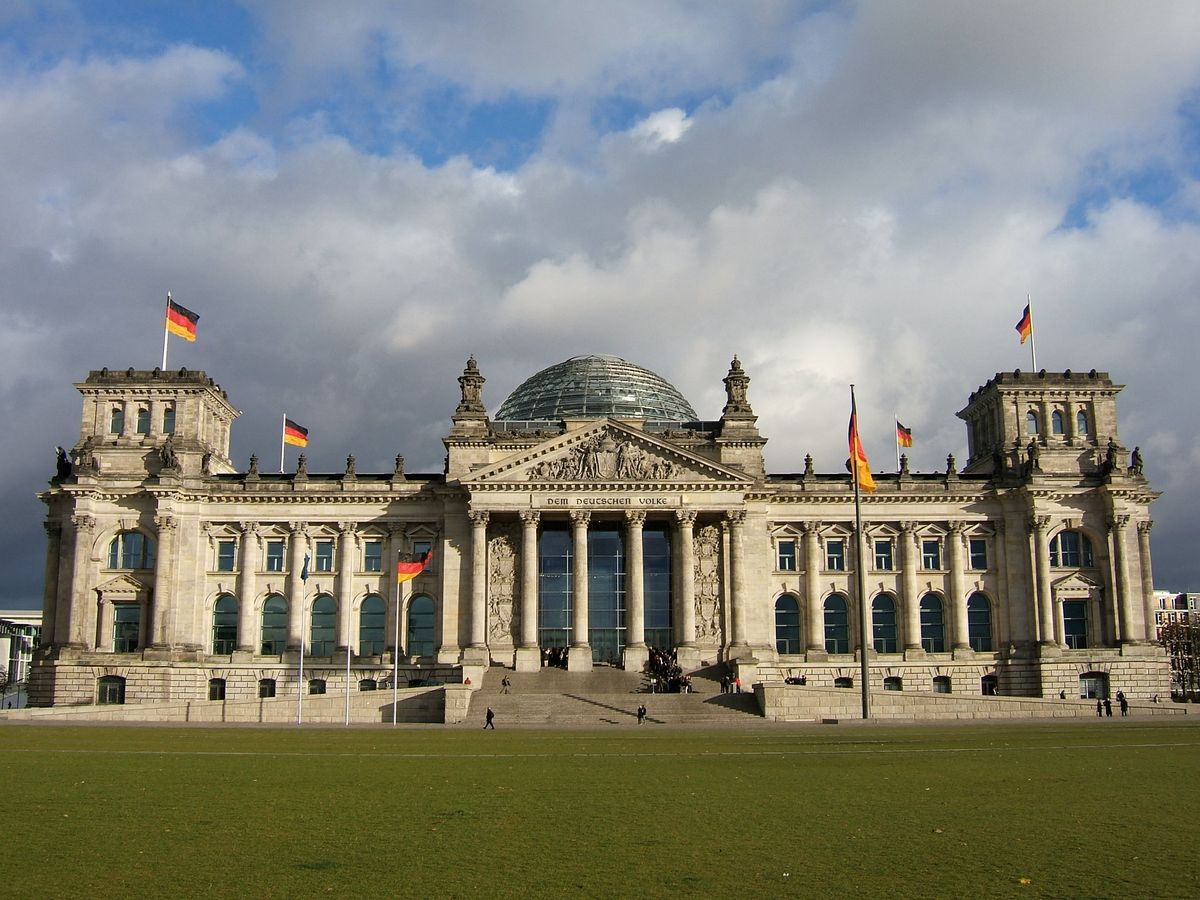Carl Schmitt’s Critique of Liberal Democracy

It was once said that the role of boredom in political life is rarely appreciated. This is especially true when it comes to assessing the political right, which is often conceived of by its liberal opponents as stodgily committed to upholding tradition and convention even in the face of looming irrelevance. In fact, as I’ve discussed elsewhere, the characterization of conservatism as a defense of tradition is at the very least problematic. The political right is first and foremost defined by its defense of a preferred hierarchy, with the particular form varying widely depending on the communal histories and individual personalities of those involved. Almost all conservatives will be critical of the more egalitarian impulses of liberals and socialists. But for the more imaginative, merely defending a tired and incapably ruling class which flails impotently in the face of levelling modernist egalitarians is a recipe for disaster. In these circumstances, theorists on the political right will often show an openness to experimentation and radicalization that belies the stereotype of being rigid fundamentalists. One of the appeals of far right radicalism can be its dramatic promise to break the shackles of mediocre mass society, and offer a spectacular politics of antagonistic speed, cosmic struggle, and of course violence. It’s also at such points that the most rabidly anti-egalitarian yearnings can bear their darkest fruit, as the transactionalism and routinized exploitation that defines liberal capitalism give way to more direct and imaginative forms of domination.
No figure embodied these tendencies better than Carl Schmitt, the German political and legal theorist and once upon a time the chief jurist of the Nazi regime. Schmitt lived almost a century ago, and wrote extensively and pointedly on almost every major political and geopolitical issue of his day. With a vivid style more reminiscent of his fellow anti-egalitarian Nietzsche than of the opaque and impenetrable webs of verbiage more commonly associated with German theorists, Schmitt’s writing sparkles with a savage intelligence and a remarkably architectonic talent for diagnosing the weakest points in an opponent’s position and attacking it with surgical precision. The politics he conjures is simultaneously one of stark, primary colours and black gulfs; eons away from the stately dialogues between “ends in themselves” idolized by Kant. That Schmitt turned these gifts to upholding the most evil political regime in human history is one of the more troubling scandals in political thought.
In what follows, I’ll briefly summarize Schmitt’s life and the broad contours of his critique of liberalism. I will then consider how liberals (and liberal socialists like myself) ought to respond to the influential fascist thinker.
A brief biography
Carl Schmitt was born in 1888 to a petty bourgeois family in Westphalia. He was given a first class education, but grew up in a conservative Roman Catholic household. It is said that the hand that rocks the cradle is the hand that makes the man, and while Schmitt broke from the faith of his youth its influence permanently haunts his writing even close to a century later. After the First World War he became a rising star in German legal and intellectual circles, producing his most well-known books as a young professor at a variety of institutions. This included Political Theology in 1922 and the first version of The Concept of the Political in 1927. In 1928 he published what is arguably his magnum opus, Constitutional Theory, which argued that the young Weimar Republic was riven by constant pressures that went to the heart of its political and legal architecture. While many of his contemporaries looked with horror at what that might mean, Schmitt was more than a little intrigued and fascinated by the excitement of the times. He speculated that a representative democracy was little more than any oxymoron. Appealing to Jean Jacques Rousseau, Schmitt observed that if democracy genuinely meant law which expressed the will of the entire people then any divided citizenry that broke into factions vying for parliamentary power could not form a genuine demos. By contrast Schmitt took an almost Mephistophelean glee in observing that a Dictator who genuinely embodied the entire people could be said to will on the behalf of all, almost paradoxically being more authentically democratic than the claptrap of party politics.
Schmitt was proven correct in the 1930s, when the Nazi Party rose to power, with only the left wing Social Democrats and Communists rivalling their popularity with the masses. He initially sided with the more generically reactionary factions led by President von Hindenburg, advising them to outmaneuver both the far right and the far left through bypassing the Reichstag and ruling by decree. But once the Nazis swept to power, in coalition with the conservative Nationalist Party, Schmitt threw in his lot with Hitler and Goebbels. He published a series of essays and books justifying everything from state repression and dictatorship to the emergent anti-Semitism and racism of the NSDAP. Probably the most noxious of these latter writings was Leviathan in the State Theory of Thomas Hobbes, where he castigates “Jewish philosophers” from Spinoza through Karl Marx for exploiting the gaps created by liberalism to demand inclusion for themselves and other groups. This weakened the power of the state by reducing its politics down to an endless managerial effort negotiating between different group identities and their value systems.
After the Second World War Schmitt refused to be de-Nazified, arguing he had done nothing wrong, and carried on as an independent scholar and writer. Undoubtedly his most significant work at this time was 1950’s The Nomos of the Earth, which provided a magisterial history of international law and critiqued the utopian sensibilities of liberal cosmopolitanism. In particular, he singled out the belief that global power could be innocent of violence and imposition. Schmitt died in 1985, just as the Cold War neared its end and liberalism seemed the sole victor at the “end of history.” But as far right and post-modern conservative movements have enjoyed a global renaissance, so too have his writings. Figures like Adrian Vermeule and Michael Anton have cited or been compared to Schmitt for their lacerating critiques of liberal politics and demands for a more authentically right-wing state.
The existential anomie of liberal parliamentarianism
Schmitt’s critique of liberalism shares a lot in common with the aristocratic counter-culturalism of Nietzsche and Heidegger; particularly their shared conviction that one of the big problems with liberal democracy is how fundamentally boring it can be. Schmitt’s consistent attraction to an intensely antagonistic politics, wherein the theological divides over the problem of human existence are elevated to their highest pitch, contrast starkly with the stately and rationalistic ruminations of J.S. Mill or Mary Wollstonecraft. From a Schmittian standpoint, liberal politics is characterized by an endless withdrawal from the most existentially fundamental problems of human life. Indeed, it is precisely this cowardly and intellectually incurious withdrawal that occupies pride of place in the liberal tradition. Rather than settling on a particular vision of the good life and the highest ends of life, and standing by it even in the face of relentless animosity, liberals insist that their preferred state be “neutral” and tolerant. The function of the liberal state is merely to establish an orderly legal framework preserving an individual’s rights to do what they wish—crucially within circumscribed parameters—and then leave them free to pursue their hedonistic desires. Often this was ideologically linked to a defense of market capitalism. Contemporary Schmittian style critiques, focusing on this faux emphasis on neutrality, tend to foreground liberalism’s recent endorsement of multiculturalism and rainbow coalitions as the most recent evolution of this outlook.
Seen from this perspective, the basis of the Schmittian critique might simply be a conventional right wing disdain for liberalisms’ wishy washy efforts to achieve equality and liberty for all. And certainly part of Schmitt’s distaste is a willingness to try and avoid the burdens of choosing between the values embodied in distinct political theologies. But in a rather existential vein, this isn’t because Schmitt himself believes there is some foundational set of values whose truth determines that we embrace them. Instead the choice itself is determinative, and the will to make it indicative of a kind of elevated disposition. Indeed in Political Theology he expressly compares this fetishized decisionism to a “miracle.” For Schmitt, liberalism’s constant withdrawal from existentially fundamental problems reflects its desire to endlessly postpone the political moment of deciding what values are to be determinative. It achieves this through a compromise with democracy, holding that the proper approach to determining which values are to prevail should be to deliberate upon them through the media of representative democracy. Parliaments, Congress, and the Reichstag claim to be legitimate and democratic because they alone—unlike dictatorial and aristocratic regimes—represent the whole of society. All of its diverse groups, with their different political theologies and associated values, are included. For Schmitt, this deliberative effort to talk one’s way past the decision of which political theology is to prevail is banal and uninspired. But worse, it is in fact not even possible. As he put it in Constitutional Theory.
First of all, there is no state without representation. In a fully implemented direct democracy where the ‘entire people,’ all active state citizens, are actually assembled in one place, perhaps the impression arises that the people act in its unmediated presence and identity as the people and that one can no longer speak of a representation in regard to the people…In fact, in the extreme case, only all adult members of the people act and then only in the moment when they are assembled as the community or as the army. But even all active state citizens, taken as a whole, are not the political unity of the people. They merely represent the political unity, which transcends an assembly convened at a particular time and place.
In other words, to claim to represent the people, liberals must already presuppose who the “people” that politically count are. Here we already see the limitations to their willingness to extend indefinite equality and freedom to everyone, since in the early 20th century as today conventional liberalism still operated in a statist vein where most of the world’s population was excluded from participation or representation. This was even the case where, as was the norm with the colonial European empires of Schmitt’s time and remains the case for different reasons today, huge numbers of people were dramatically impacted by the decisions of liberal politicians but were denied genuine rights to participation and inclusion. This brings us to Schmitt’s most iconic objection.
Liberalism’s hypocrisy
Framed in this way, Schmitt’s critique of liberalism might appear little differently from other far right commentators like Nietzsche or Robert Carlyle, who also lambasted the talk shop quality and hedonistic materialism of liberalism. But in the heady days after the First World War, these kinds of objections had less traction than they once might have had. The liberal states had soundly routed their authoritarian competitors in central Europe, and contrary to Bolshevik claims, had also withstood the revolutionary enthusiasm spreading from the new Soviet Union. This surprising resilience in the face of major pressures needed to be accounted for. At the same time Schmitt was decidedly more nationalistic and less romantically individualistic than his predecessors. He came to define the conflict between political theologies and their associated values as one between great blocs of “enemies” and “friends” whose most marked animosity came when they were organized into states. In this respect each well-functioning state came to symbolize a totality unified and easily mobilized on behalf of its shared political convictions, strikingly opposed to its competitors. As he put it in The Concept of the Political:
The political is the most intense and extreme antagonism, and every concrete antagonism becomes that much more political the closer it approaches the most extreme point, that of the friend-enemy grouping. In its entirety the state as an organized political entity decides for itself the friend-enemy distinction.
Here liberalism might appear to fundamentally avoid the perils of a genuinely political antagonism, precisely because it remains so committed to equal freedom and toleration for all. But Schmitt, drawing on his practical experiences in the shaky Weimar Republic, contended that this was a hypocritical farce at best or a fundamental weakness at worst. It was a hypocritical farce because in fact liberalism was committed to a political theology; one which held that the highest ends and values of human life were to be found in the gratification of individual desire. These are to be gratified through either the efficient operation of markets and big corporations, management by a parochial and bureaucratic liberal state, or some combination of the two. The pursuit of immaterial or transcendent conceptions of the good which can’t be satisfied in this manner was permitted only so long as it didn’t challenge this liberal theology. Where it became politically threatening liberal states reacted in one of two ways. Either they abandoned the rhetoric of toleration and attempted to use force to dissolve the competition. This entailed making a constitutive “exception” to the normal operation of tolerant liberal law through declaring a dangerous political enemy “unreasonable” or more ironically still “illiberal.” Or liberal states allowed the growth of an enemy that held to different theological convictions, leading to their likely doom and replacement. This is of course what happened in the Weimar context, when none of the major parties committed to representative democracy and liberalism were willing to simply ban the Nazi party to eliminate the threat it posed.
This Schmittian critique has enjoyed a rebirth on today’s political right in part because it conforms neatly to many shrill anxieties about cancel culture, social justice activism, and conservative victimization. It allows right wing critics to turn the tables on their liberal adversaries and claim they are no different than themselves in being unwilling to tolerate political deviance. The difference is simply that the political right is more honest and strong-willed in its willingness to decide which groups get to count and who does not, while liberals assume a posture of moral superiority through preaching toleration while practicing discrimination (mainly against conservatives).
Responding to Schmitt
Schmitt was very much a totalizing figure. His thought and inclinations drifted neatly into binary oppositions, where one must either be a friend or an enemy. The legal norm or the exception. Authentic and pure or hypocritical and banal. This gives his arguments a kind of vivid coloration which runs very counter to the image of the right wing thinker as an aloof defender of privilege. If anything, rather like the far right today, it manages to conjure a kind of counter-cultural allure. Liberal opponents are castigated for either embodying the existential tedium of a managed pseudo-democracy which claims to represent the people but in fact just divests their energies into endless deliberation, or as variably self-conscious hypocrites committed to a nihilistic and atomistic political theology to be imposed on everyone through force. Indeed by the time of The Nomos of the Earth, Schmitt ruminated that liberalism had become powerful enough to abandon its statism like an eagle emerging from an egg. It was now capable of using American imperial power to install itself across the globe through a new international legal regime, which professed to embody universal human rights and the possibility of worldwide emancipation, but in fact was just as prone to war, interventionism, and imperial hubris as the next hegemon. In such a context its arrogant claim to represent the interests of all humankind were simply an attempt to “cheat,” to present its exercises in power and violence as innocent.
One way to respond to Schmitt is by pointing out that such a totalizing and bifurcated form of reasoning simply evades dealing with the complexity of real material conditions and practices. Put simply, the idea that a liberal state either tolerates everything or it becomes little better than its opponents is almost charmingly reductive. There are plenty of respects in which one can condemn the liberal state, and indeed the international order, for failing to tolerate and include other doctrines. Indeed, one gloomy way of framing the history of liberalism could be as a struggle for recognition on the part of those who have been denied basic liberal rights and opportunities for political participation. This extends to the international level, where the universality of liberal values was all too often invoked as a license for all kinds of imperial and colonial tyranny.
But compared to its authoritarian and totalitarian competitors, especially contemporaneously, liberal states have gradually expanded the purview of toleration and rights to include many groups which have previously been marginalized. When they’re not complaining that conservatives are the real victims of liberal intolerance, the usual counter claim is that we have become far too tolerant of the unworthy, the foreigner, or the stranger. In this respect the Schmittian effort to diagnose liberal efforts to live up to their own standards as being undermined by hypocrisy itself often becomes chimerically self-imploding. Schmittians despise liberals for wanting to tolerate others, and then despise them more when they don’t live up to the hype. The response of liberals should be to constantly follow the impetus to be as inclusive as possible, constantly expanding our universe of moral concern.
But the practical demands of political life entail there will always have to be compromises made. These should be as minimal as possible, but they will be inevitable. This process of achieving a reflective equilibrium between the demands of principle and political reality will inevitably be controversial. But contemporary liberals can certainly claim to be far more tolerant and inclusive than their predecessors, and certainly vastly more than “illiberal” and post-liberal authoritarians who lazily feel these challenges mean we should just abandon the effort at all.
But the more decisive objection is to argue that liberalism is not simply neutral with regard to values and the highest ends of life, but in fact is more appealing than its competitors. The excitement and drama of life emerges from the formation of complex relationships with other persons who do not simply mirror our selves and our value system back to us. In their alterity they make demands both for a recognition of their distinctiveness and consideration of alternate possibilities for our life and the paths we might choose to follow. For liberal expressive individualists like J.S. Mill or Amartya Sen, the good life was best approached by not enforcing one vision upon us, but allowing each to experiment and learn from one another to get ever closer to an ideal. I would go even further and argue that in a just liberal socialist society each of us would be empowered to pursue our individual projects, but in a cooperative and democratic manner that eliminates the ongoing disparities in human capacity of power which generate so much resentment.
At its core much of the power of Schmitt’s objection comes from the withering disdain it heaps upon liberal society for its alleged banality and decadent materialism. It lacks the excitement and grandeur of a genuine and existential political struggle, where the will to overcome our antagonists forces unity and the authentic dissolution of the atomized individual into a people. But as far as I can see nothing could possibly be less interesting than the Schmittian alternative of a unified people organized by a total state. At best it would be characterized by grandiosity without grandeur, totality without transcendence, and commitment without conviction. In it the pluralism and variety which emerges from human freedom is liquidated into mere uniformity. At worst it would find an endless license for spectacular violence in the need to continuously eliminate competing theological visions.
We don’t need to speculate much since we know where the Nazi cause Schmitt committed himself to wound up. Erich Fromm ruminated on these topics in his classic The Art of Loving when he put forward that the true basis of fascism was a terror of what we do not understand, and the desire to curb human freedom as the wellspring from which the new and unpredictable might appear. This culminated in the Nazi yearning for death on a mass scale, as the final nihilistic expression of a yearning to return the world to state of absolute order. Schmitt’s failure to foresee this possibility means we should be very wary of his ideas. They’ve earned their place in the sewage of history.
Featured Image is Reichstag, by WordRidden




